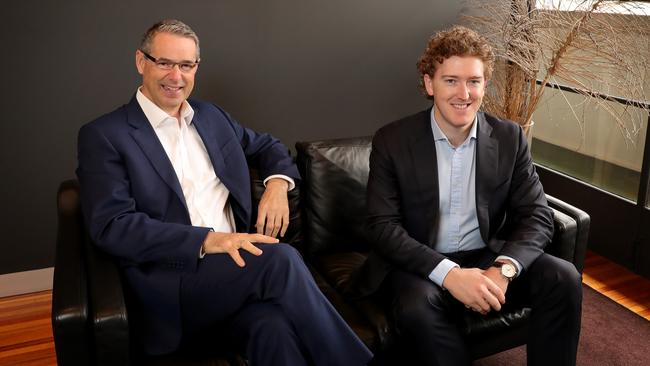Stephen Conroy sees life on the other side with Sargon
Former federal communications minister Stephen Conroy has joined the board of financial infrastructure provider Sargon.

Former federal communications minister Stephen Conroy has joined the board of financial infrastructure provider Sargon, as the company moves to position itself as the technological backbone for Australia’s multi-trillion-dollar superannuation industry.
Mr Conroy, who is also on the Australian Strategic Policy Institute council, told The Australian he was keen to take up board positions and was drawn to Sargon because of its position at the intersection of tech and financial services.
He joins executive director David Chen on the Sargon board, along with CEO Phillip Kingston and the non-executive chairman, former Crown chair Robert Rankin.
“Rob and I both worked with James Packer and we’re both crazy Chelsea fans,” Mr Conroy said. “It’s such an exciting moment in fintech, and I spent the first half of my career doing financial services, superannuation and corporate law. What Sargon brings is a new platform to enhance member benefits, have better services and communications and financial literacy … It’s very exciting.”
Sargon boss Phil Kingston said the company’s mission was to help build “Superannuation 2.0”, which would centre around dragging down fees and replacing manual work with automation.
It’s busy building out its cloud platform — dubbed the Sargon trustee cloud — which includes a number of tech products designed to help funds save time and money, an approach Mr Kingston compares to supplying electricity to a street of restaurants.
“We bear the brunt of regulatory changes, we make that our core business, so no one else needs to do it,” he said.
“The key feature of super 2.0 will be a radical transformation in cost structure driven by technology. And super should be focused on advancing the economic interests of all Australians. A lot of nation-building products can come out of super, so it’s not all about costs, it’s about returns and values.
“What do we want to stand for, and be great at? Super has an active role to play.”
Sargon, which was founded by Mr Kingston and fellow Australian entrepreneur Aron D’Souza, and once counted Silicon Valley giant Peter Thiel as an investor, is rumoured to be heading towards an IPO later this year but Mr Kingston said the board had not settled on a particular option.
“We’re focused on seizing the moment with the tailwinds we’re benefiting from right now,” he said. “It’s time to go hard at the market.”
Technology companies like Sargon rely on robust broadband infrastructure and Mr Conroy, the former minister for broadband, said he was now an interested observer when it came to the NBN and that there had been a lot of water under the bridge since 2013, when the Coalition took over management of the project.
“Labor, if they were to win government, have got to be able to make an assessment based on all the relevant information,” Mr Conroy said. Labor communications spokeswoman “Michelle Rowland’s position is, ‘I need the facts’, and she’s not making grandiose statements and promises until she’s got the facts. I think that’s a very wise position for her to take.”
Mr Conroy added that in terms of the vision of building an infrastructure platform to service all of Australia, he thought “we’ll get there”.
“All Australians want to see improved broadband right across the country,” he said. “It’s still got some way to go to be completed, and then there needs to be a stocktake of where to go after that.”
The local technology sector has received criticism for not communicating well with Canberra, and Mr Conroy said both sides had a responsibility to be open to conversation. “The challenge is for Canberra to keep up with technological change,” he said. “It moves really fast … More ongoing dialogue between industry associations and Canberra is vital.”
He added that Australia’s tech sector needed to keep knocking on the doors of Canberra to communicate its importance. Mr Kingston agreed, declaring that while politicians had a responsibility to spend more time learning about tech, the tech industry needed patience. “The tech industry needs to be thoughtful and have sympathy for the people trying to get it right,” he said. “We have to be measured and thoughtful so we don’t kill the golden goose of the economic growth we’ve had for the past 30 years.”



To join the conversation, please log in. Don't have an account? Register
Join the conversation, you are commenting as Logout